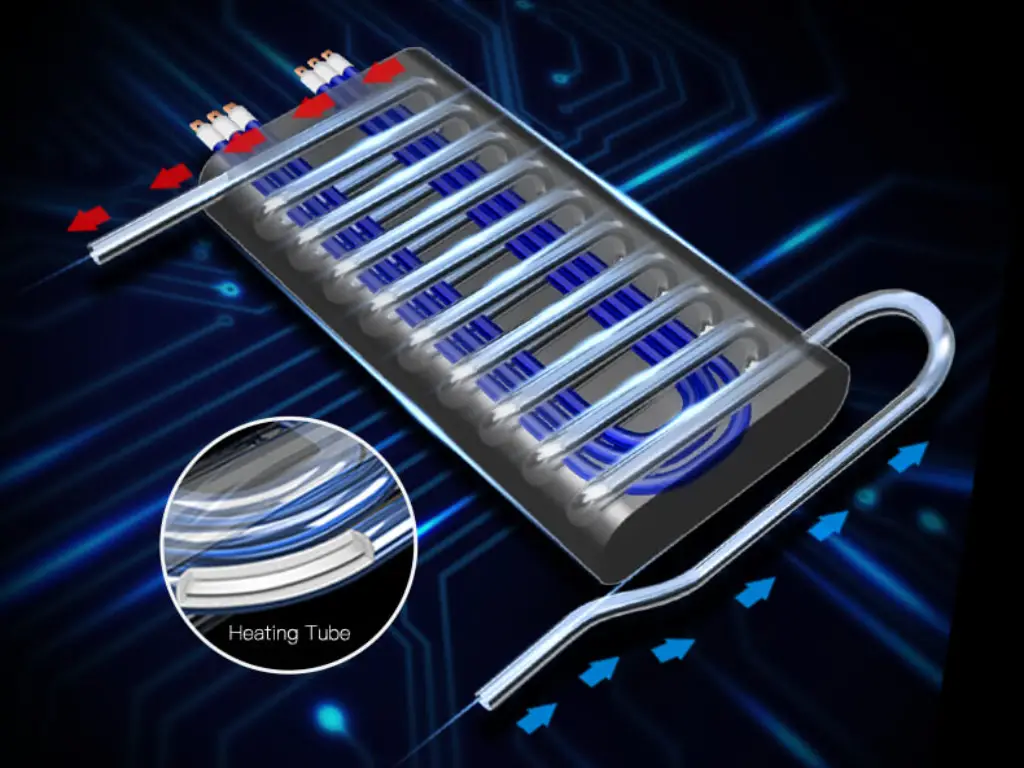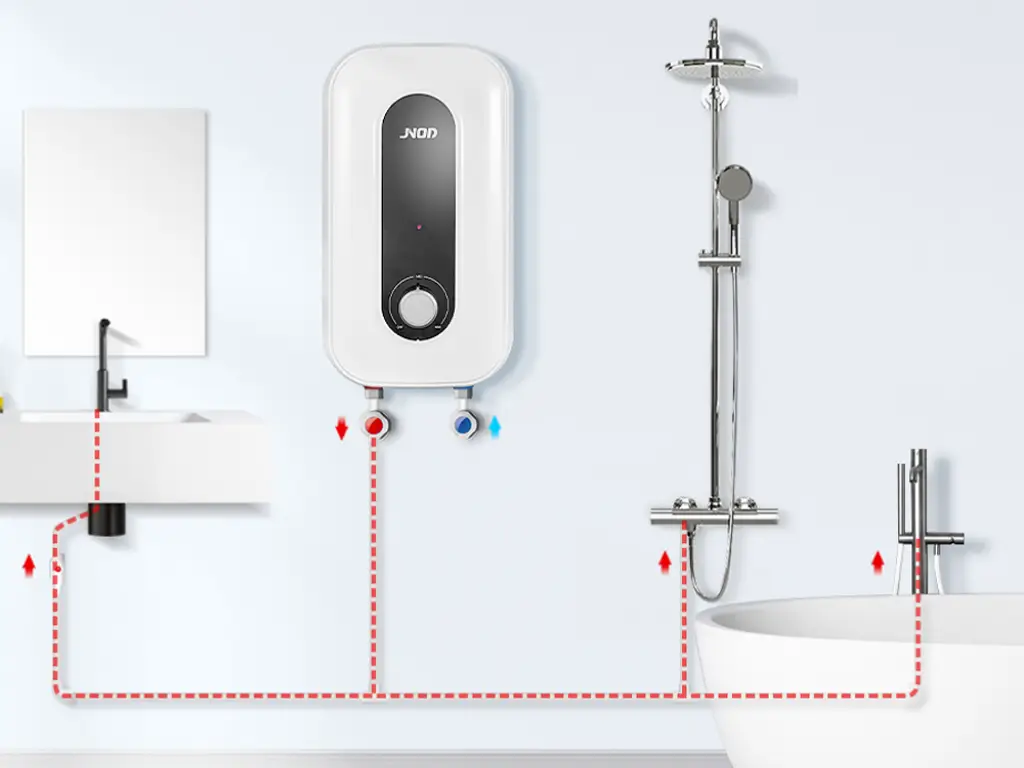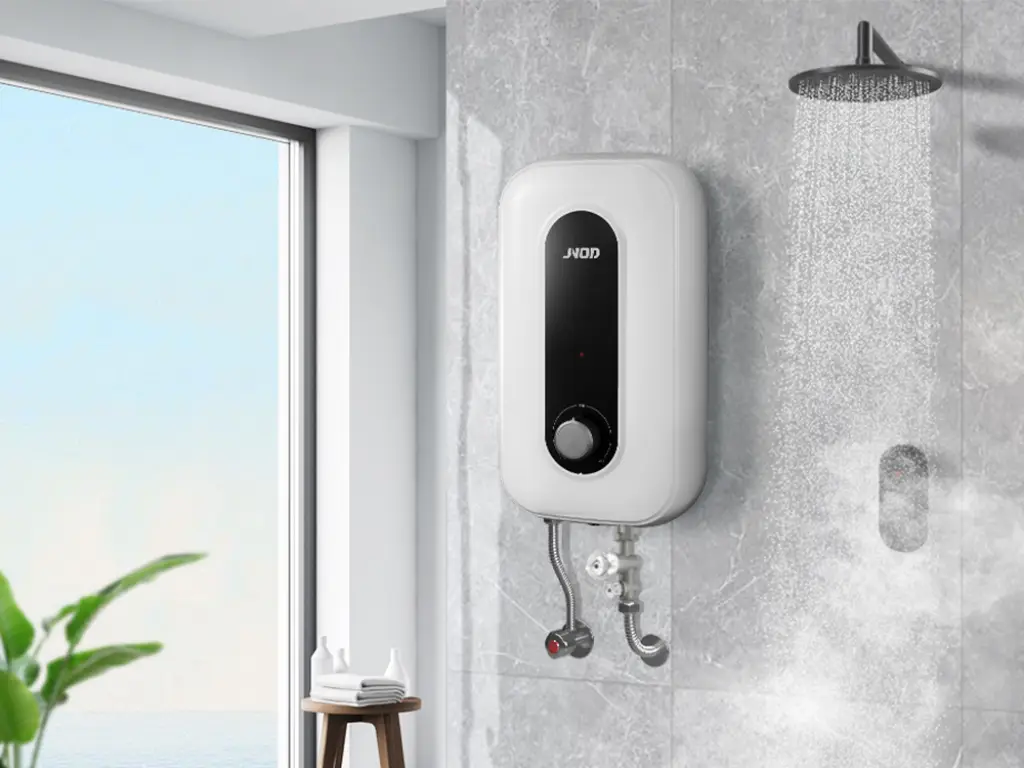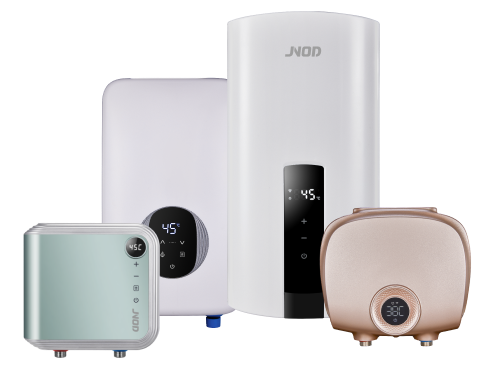Tankless water heaters, which are also called on-demand or instantaneous water heaters, have been appreciated by many users for their energy efficiency and space-saving design. Whereas traditional storage tank water heaters store hot water in a big tank, tankless water heaters provide hot water on demand without the need for a large storage tank. This groundbreaking technology has completely changed the way we heat water at home, delivering a more environmentally friendly and user-friendly alternative.
In this paper, we will delve into the mechanics of tankless water heaters, reviewing their pros and cons, and comparing them to the conventional storage tank water heaters. As well, we will explore the main types of tankless water heaters and give tips on how to pick the proper one for your home. It is important to note that whether you are planning to replace your existing water heater or build a new home, you need to understand how tankless water heaters work and their advantages to make a right hot water choice for your house.
What is a Tankless Water Heater?
A tankless water heater is a small, efficient device that heats water as needed, offering a continuous flow of hot water. It doesn’t require a large storage tank like traditional water heaters do. Traditional models keep water hot in a big tank, even when it’s not being used. In contrast, tankless models activate only when you open a hot water tap. At that moment, cold water passes through the heater, where it gets quickly warmed up by either electricity or gas, and then goes straight to your tap or appliance.
These heaters vary in size and power, which makes them suitable for different settings, ranging from small apartments to spacious family homes. You can install them right where you need hot water, for instance, under a sink or in a closet. Alternatively, you can choose a system that serves the entire house, heating water for several outlets at once. Their compact design is a plus for homes with limited space. You can mount them on a wall or, in some cases, even place them outside.
Related Post: Tankless vs Tank Water Heater: A Comprehensive Guide
How do Tankless Water Heaters Work?

Tankless water heaters heat water only when it is needed. They use either electricity or gas for this purpose. When you turn on a hot water tap, cold water enters the heater. Inside, there is a heat exchanger made up of coils or fins. This part heats the water quickly as it flows through.
For an electric tankless water heater, the process involves cold water flowing over a heated electric element. This warms the water up to the required temperature. The warm water then leaves the heater and travels to your tap or appliance. Electric tankless heaters usually need their own electrical circuit and often cost more to install than gas models.
Gas-fired tankless water heaters work in a similar way but use a gas burner instead of an electric element. When you turn on the tap, the gas burner lights up and heats the water as it passes through the heat exchanger. These heaters can heat more water faster compared to electric ones and are often more cost-effective to run, since gas is usually less expensive than electricity.
Pros of Using Tankless Water Heaters
Energy Efficiency
Tankless water heaters are known for being very energy efficient. Traditional water heaters with storage tanks keep heating and reheating water, even when you don’t need it. This wastes energy. Tankless heaters, however, only use energy when you turn on the hot water. This method prevents energy from being wasted, leading to more savings on your energy bills. The U.S. Department of Energy notes that tankless water heaters can be 24-34% more efficient than traditional ones in homes that use up to 41 gallons of hot water each day.
Many tankless water heaters also come with additional features that improve their efficiency. For instance, some have modulating gas valves. These valves adjust the size of the flame based on how much hot water is needed, making sure the heater works efficiently regardless of water flow. Others include self-modulating technology. This technology adjusts the power of the heating elements to keep the water temperature steady, even when several outlets are using hot water at the same time.
Space Savings and Installation Flexibility
The other big advantage of tankless water heaters is their compact size and the fact that they can be mounted anywhere. The more traditional water heater with a tank is big and it takes up a large space on the floor. Unlike tankless water heaters, tankless water heaters are small and can be mounted on the wall. This reduces the space required, which is a great advantage, especially for people who live in tiny apartments, condos, or small houses.
The small size of tankless heaters, on the other hand, provides for more installation options that are not limited to a particular area. They can be located directly where your hot water is used, like under the sink or in a closet. The design of this system allows hot water to travel shorter distances, reducing the amount of heat lost in the pipes.

Unlimited Hot Water Supply
One of the greatest advantages of tankless water heaters is that they can give a hot water supply which is endless. Tankless water heaters differ from storage tank water heaters that can run out of hot water when the demand is high because they heat water on demand. So, you will never run out of hot water as long as there is a sufficient flow rate and the unit is properly sized for your home’s needs.
The key to the endless supply of hot water is the process of heating water in the tankless water heater. When you open a hot water tap, cold water circulates through the unit and is immediately warmed up either by an electric element or a gas burner. So, as long as the water line is always cold and the tank has enough heating capacity, it will keep heating water on demand, ensuring that hot water is available at any time. In other words, you can have a shower after another, run several appliances at the same time, or fill a large bathtub without having to worry that there is no more hot water.
Long Lifespan
Tankless water heaters are durable and they also have a relatively long lifespan. Among these reasons are: The first advantage is that they do not store the water which is less likely to corrode and mineral buildup. This is one of the problems that are seen in the old water heaters with tanks. The absence of the tank means fewer leaks and repairs, which consequently, adds to the lifespan of the tankless heaters.
Secondly, tankless water heaters have built-in safety features and the capability for self-diagnosis. These characteristics are responsible for a damage-free operation and longer life span of the heaters. Take for example safety valves that prevent models from getting too hot or building up too much pressure. This leads to the decrease of the possibility of loss. Also, some heaters are designed with sensors and monitoring systems that help in finding leaks or abnormal water flows in the early stages. This will help you to address these problems in advance before they turn into major issues.
Finally, the tankless water heaters are manufactured with parts that can be easily replaced such as heating elements, flow sensors, and control board. This design will be easy to repair and maintain, which will increase their lifespan. If you install it properly, maintain it regularly, and use water wisely, a tankless water heater may last as long as 20 years or even longer. This is a longer period compared to the 10-15 years typically expected from the conventional tank water heaters.

Cons of Using Tankless Water Heaters
Higher Upfront Costs
The fact that tankless water heaters initially cost more than conventional tank water heaters is one of their key drawbacks. A tankless type is usually 2 to 3 times more costly than a tank-equipped equivalent. Its features, size, and fuel type all influence this increased cost. This hefty upfront cost can be a significant obstacle for many homeowners, particularly those with tight budgets.
Apart from the cost of a tankless water heater, there are other expenses that need to be considered. As an example, gas models may require a bigger gas line or a new vent system for the extra gas flow and exhaust. Electric models might be necessary to upgrade the home’s electrical system. It can be achieved by creating a separate circuit and using thicker wires. Such additions increase the total installation cost.
Although the initial cost is higher, tankless water heaters are more energy efficient and hence they can save energy bills over time. They also last longer, that means you may not need to replace them so often. These benefits can partially or fully offset the initial higher cost.
Limited Flow Rate
Another downside of tankless water heaters is that they usually can’t provide as much hot water at once as traditional tank water heaters can. The amount of hot water a tankless heater can deliver is measured by its heating capacity, in gallons per minute (GPM). Basically, the greater the heating capacity, the more hot water the heater can supply at one time.
Despite this, even the most powerful tankless heaters may not be able to keep up when multiple hot water taps are used simultaneously. For instance, if a shower and a dishwasher are running at the same time, the heater might not be able to maintain the needed water temperature or flow rate. This problem can be especially noticeable in larger homes with high demands for hot water.
To overcome this limitation, some homeowners choose to install several tankless water heaters. They might set these up as individual units for different areas or link them in a cascading system to better meet their hot water needs. Alternatively, choosing a tankless water heater with a higher heating capacity might also solve the problem, ensuring enough hot water is available when multiple fixtures are used at once.
Potential Temperature Fluctuations
The tankless water heaters are designed for continuous hot water delivery. However, there could be certain cases when users will feel the difference in water temperature. There are several factors which cause this, including the power of the heater, the initial temperature of the water and the speed at which the water flows.
The “cold water sandwich” effect is the most common cause of these temperature changes. This is by turning off hot water momentarily, thus allowing the cold water to accumulate in the pipes that run from the heater to the tap or shower. With hot water being used, there could be a momentary rush of cold water before it gets warmed up again. This is usually more obvious when long pipes are used or when hot water is used repeatedly.
The heater is another issue that may require a certain amount of water to flow in order to turn on. Most of the tankless heaters require the water to flow at least 0.5 – 0.6 gallons per minute for the heating to start. If the flow is lower, like when the faucet is just a little open, the heater may not be turned on, and the water would be cold.
This is the reason why some of the tankless heaters come with special features like pumps that recirculate water or small tanks that buffer against the changes in temperature. Moreover, selecting the appropriate size of your heater, installing it properly, and insulating your water pipes will help you to avoid this and keep the temperature of your water more stable.
Types of Tankless Water Heaters
Electric Tankless Water Heaters
Electric tankless water heaters are preferred by many homeowners as they are eco-friendly and energy saving. These heaters are equipped with electric elements that instantly heat water, thus removing the requirement for a storage tank.
One of the important advantages of electric models is that they are easy to install. They don’t need a gas line or a venting system, this allows you to install them in many places, including areas without gas service or where it’s hard to vent outdoors. In addition, they are smaller in size and take up less space, which is ideal for small homes with limited space.
Gas-Fired Tankless Water Heaters
The gas-fired tankless water heaters are also one of the options that are preferred by many people. They utilize either natural gas or propane to power a burner, which heats the water as it flows through a heat exchanger.
These heaters are in fact very powerful, they produce hot water faster than electric models do. These models are capable of supplying hot water for larger households or homes with many people using hot water at the same time, such as while several people are taking showers and doing the dishes at the same time.
The gas models are more likely to be economical in the long run as gas is cheaper than electricity. Many times, they have auxiliary devices that make them run more efficiently, like adjustable gas valves and condensing technology.
Understanding the differences between gas and electric tankless water heaters can help you decide which is more suitable for your home.
Tankless vs Traditional Water Heaters
When you compare tankless and traditional water heaters, it’s important to consider several key factors. These include energy efficiency, cost, size, and how much hot water they can deliver at once, known as flow rate. Below, you’ll find a simple table. This table clearly shows the differences between these two types of water heaters to help you make a well-informed choice:
| Feature | Tankless Water Heater | Traditional Storage Tank Water Heater |
| Energy Efficiency | Up to 34% more efficient, heats water on demand, resulting in energy savings. | Less energy-efficient due to continuous heating and reheating of water, leading to standby energy losses. |
| Initial Cost | Higher upfront cost, 2-3 times more than traditional models. | Lower upfront cost, more affordable initially. |
| Size and Installation | Compact and wall-mounted, offers installation flexibility and saves space. Ideal for homes with limited space. | Larger and requires floor space for the tank. Less flexible in terms of installation locations. |
| Flow Rate and Performance | May have a limited flow rate, posing challenges for larger households or simultaneous hot water needs. | Higher flow rate, capable of providing a steady supply of hot water even during high demand. Stores a large volume of hot water in the tank. |
| Long-term Savings | Potential for significant energy savings over time, helping to offset the higher initial cost. | Higher operational costs due to less efficiency, though cheaper initial investment. |
Frequently Asked Questions
How Long Do Tankless Water Heaters Typically Last?
Tankless water heaters usually have lifespan of 20 years or more, which is much longer than traditional storage tank water heaters, lasting about 10-15 years.
Can I Use a Tankless Water Heater in a Large Family Home?
Certainly, tankless water heaters can serve for large family homes. Nevertheless, you should make sure that the unit you select has a sufficient flow rate to meet your hot water needs and that you install a few units to accommodate your hot water requirements.
Choose JNOD Tankless Water Heater Solutions
JNOD offers a pool of superb tankless water heaters. Being energy-efficient, these devices are perfect for both houses and businesses. They provide energy saving, reliable services and customer satisfaction. JNOD tankless water heaters are a proven solution if you are looking for a hot water system upgrade.
All JNOD tankless water heaters are equipped with basic features. Such include adaptable technology, digital temperature controls and many safety features. These features are responsible that the heaters work correctly and safely. JNOD is a company that provides excellent after-sales service for its products as well. They provide professional installation, assist with maintenance and repairs, and a warranty which is very strong.
If you are going for JNOD, you can be sure of an efficient and reliable water heating solution. It has been well-tested for your home or business.
